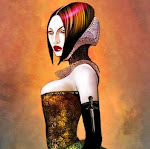Other key points include:
1. Long association of director Greg de Polnay with RADA, where he has directed dozens of Shakespeare plays and taught classical acting for many years.
2. Established reputation of director Roz Riley, founder and artistic director of the highly acclaimed independent theatre company Factory Space in Sydney.
3. Success at both the Edinburgh and Adelaide Fringes, backed by excellent reviews.
4. Proven appeal to students and school groups, supported by availability of workshops.
5. Professional marketing skills of Producer, Kath Perry, who has 20 years' consulting experience in PR.
There is a wide range of top-quality, professional marketing materials available for the show. These are aimed at the following audience segments:
1. Women: love seeing powerful heroines on stage, especially if they are 'bad, mad and dangerous to know'!
2. Shakespeare buff: delight in seeing lesser-known scenes and meeting new characters.
3. Teachers and students: appreciate the opportunity to 'dip into' a variety of plays Shakespeare's plays and explore issues of family, gender and power.
4. Audiences new to Shakespeare: discover their ability to understand and enjoy his work
5. Local audience: supports local venue/festival and enjoys the quality theatre it brings them.
The marketing plan for the show will generate audience by maximising opportunities for people in these segments to encounter compelling information about the show, making full use of the image, the usp, targeted messages and third-party (reviewer) endorsement, and utilising a wide range of information channels, such as:
1. Social networking - eg Facebook, YouTube, LinkedIn, Blogs and Twitter
2. Web-based event media - eg What's On Stage, British Theatre, Festival podcasts
3. Web-based community media - eg Local council, Shakespeare societies, Education
4. Conventional media - eg newspapers, local radio, local tv, street, gay and entertainment press
5. Print - eg posters, fliers, programs
6. Direct mail - eg to schools, tertiary institutions, large local businesses, theatre industry
Use will also be made of cost-effective advertising opportunities where these are available and can be accommodated within the budget.

